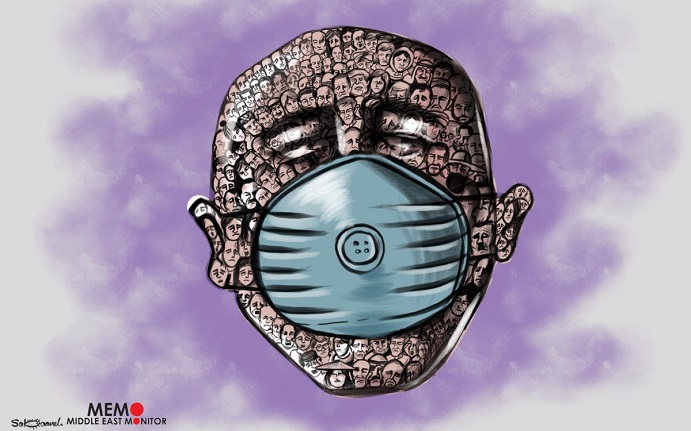Middle East Monitor / March 14, 2020
The Palestinian Authority suspended prayers in mosques and churches in the occupied West Bank on Saturday to prevent the spread of the new coronavirus, and Gaza’s Hamas rulers said all the enclave’s border crossings would be shut for travel, Reuters reports.
The Palestinian Authority’s Religious Affairs Ministry asked Palestinians to worship at home.
“In light of the Health Ministry’s recommendation to minimize contact between people and to reduce gatherings as much as possible we call upon our Muslim people in Palestine to hold their prayers at home,” a ministry statement said.
In Ramallah, a prayer leader reciting the Muslim call to prayer at one mosque in the early evening added the words: “Pray at home, pray at home.”
According to Palestinian health officials, 38 coronavirus cases have been confirmed in the West Bank, where the Palestinians have limited self-rule under the Palestinian Authority. None have been reported in the densely-populated Gaza Strip, which is controlled by the Islamist Hamas group.
The Hamas-led government said it was closing Gaza’s border crossings with Israel and Egypt for travel, excluding life-threatening cases that required medical treatment outside the enclave. Gatherings would be limited to 100 people and schools were to remain shut through March.
Citing security reasons, Israel and Egypt keep the coastal Gaza Strip under a blockade with tight control of movements over their border land crossings.
Religious authorities have so far kept Jerusalem’s Al Aqsa mosque, which is Islam’s third holiest site, open for prayers.
The Jordan-appointed council that oversees Islamic sites on Jerusalem’s sacred compound has kept it open for Friday prayers, encouraging faithful to congregate on the 35-acre complex’s outdoor grounds rather than inside its covered shrines.
The Waqf council reassured worshippers in a statement this week that the entire compound, including its golden Dome of the Rock shrine, was being “sterilised continuously.”
Muslim faithful believe the site to be where the Prophet Mohammad ascended to heaven. Jews revere it as the site of the Jewish temples of antiquity. It is one of the most sensitive venues in the Israeli-Palestinian conflict.
In Israel, where 164 coronavirus cases have been confirmed, gatherings have been limited to 100 people. Some religious authorities in the Holy Land, including the Latin Patriarchate of Jerusalem, have moved to implement crowd controls at places of worship.
Muslim majority countries have introduced a range of measures to try to halt the infection.
Egypt will suspend schools and universities for two weeks starting on March 15. Among Gulf Arab states, Saudi Arabia and Kuwait taking the most drastic decisions by cancelling all international flights.
Attendance at Friday prayers is generally mandatory for able-bodied men in Islam, but Riyadh said those under quarantine and those afraid of being infected or infecting others need not attend.
Pakistan has shut its schools and land borders and decided to limit international flights and discourage large gatherings.













